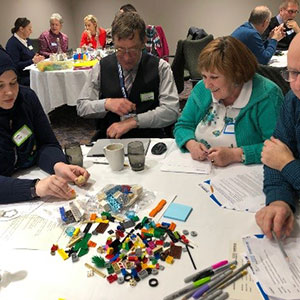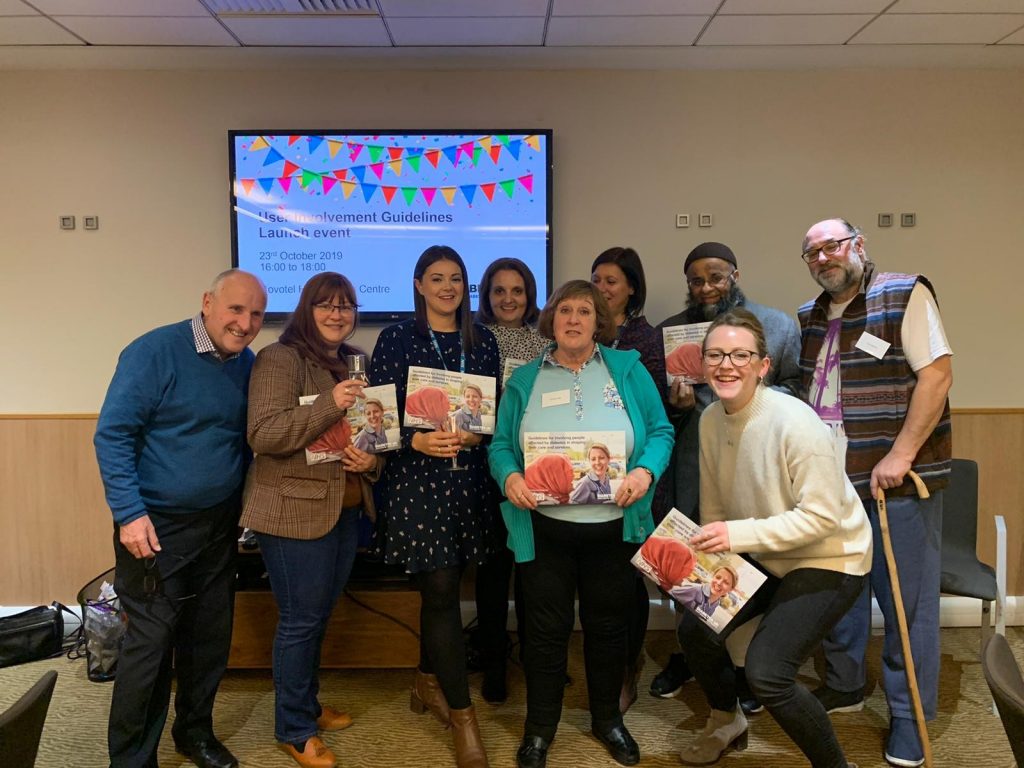New user involvement guidelines launched in the northern region
 This month saw the launch of the new user involvement guidelines in the northern region, outlining how best to involve people affected by diabetes in shaping their care and services.
This month saw the launch of the new user involvement guidelines in the northern region, outlining how best to involve people affected by diabetes in shaping their care and services.
The guidelines are a key part of our user involvement programme to embed good practice across the NHS Diabetes Programme and ensure that involving people affected by diabetes in their care becomes the norm, not the exception.
They are intended for use by anyone who works with people living with, or at risk of, diabetes, including NHS England and NHS Improvement, Public Health England (PHE), Clinical Commissioning Groups (CCGs), clinical networks and NHS Trusts.
Bridget Hopwood, Programme Manager for User involvement at Diabetes UK, said: “These days, most healthcare professionals know how important it is to listen to and involve their patients, and the impact it can have – however, we often hear that it isn’t always easy to do. These guidelines are designed to help take the first steps to meaningful involvement by giving clear actions and tips for healthcare professionals, and also to encourage consistency in how user involvement is approached across the region”.
Co-production
The guidelines are the result of a year’s work, and involving people affected by diabetes as well as staff and commissioners in its development has been an essential part of the process to ensure that the guidelines are achievable, fit for purpose and action-focussed.
Bridget continued: “We knew that it was vital that the guidelines were co-produced with the people they were for, so the whole process – from start to finish – has involved people living with or at risk of diabetes, healthcare professionals and frontline staff, and commissioners including NHS England and NHS Improvement, local CCGs and PHE to ensure the guidelines are as effective and impactful as possible.
“We worked together at a number of engagement events, starting with two workshops in Leeds and Newcastle in late 2018/early 2019. The workshops explored some of the challenges and barriers to involving service users, discussed priorities and started to produce ‘pledges’ and actions plans.”
For those that were unable to attend the workshops we ran an online survey which was shared widely to give as many people a chance to be involved as possible.
Bridget told us: “Some concerns were expressed that we didn’t have enough representation from clinical staff at the second workshop (possibly due to a five hour time commitment) so we ran two separate healthcare professional focus groups. We used this opportunity to present the draft guidelines and gain feedback.
“Once the guidelines were drafted we put them out for public consultation to gauge some views from the wider population and received 62 responses.
“It was an iterative process and we made changes and refinements to the guidelines based on feedback throughout”.
The guidelines
The guidelines are centred around the “6 Ps of involvement”:
- Promote involvement
- Positive experience
- Partnership working
- Participation for all
- Practical support
- Plain language
Each page starts with a ‘pledge’; a powerful “we will” statement, which is then supported by a number of clear actions and tips. We wanted to make the design and layout as accessible and clear as possible.
The launch – 23 October 2019, Leeds
The launch event brought together some of those who had been involved in the development process as well as representatives from local CCGs and clinical networks who have agreed to start sharing the guidelines across the area. It gave us an opportunity to thank everyone for their input and to celebrate what we had achieved together.
People were asked to share their impressions of the final guidelines, which were very positive, and we also had some useful discussions about how to use them, where they need to be shared and what ‘success’ will look like.

Next steps
Ensuring the guidelines are distributed and implemented as widely as possible in the region is a key next step – through GP surgeries, Patient Participation Groups, clinical networks, Sustainability and Transformation Partnerships and even through local councillors.
Then we need to know: are they being used? And if so how are they making a difference?
We are also exploring the possibility of awards for ‘involvement champions’ within organisations, to recognise good practice.
Natalie Murray from the NHS Diabetes Programme, NHS England Regional Team – North, said: “The Regional team are working closely with Diabetes UK to monitor the effectiveness of the newly developed guidelines. It would be great for colleagues to share examples of case studies and positive experiences with the regional team and Diabetes UK – please share your examples to user.involvement@diabetes.org.uk. The regional team will continue to update the Programme Board on the progress and impact.
“The development of the North regional service user guidelines has promoted partnership working and lots of positive enthusiasm from people affected by diabetes, healthcare professionals and various stakeholders. We are excited to see how these pledges progress and look forward to sharing our learning and experiences. A big thank you to everyone who has contributed and supported this journey with us.”
Bridget concluded: “We are really pleased with the energy and enthusiasm we have seen around the guidelines, and the desire to promote them and start using them. We are looking forward to seeing what happens next, supporting organisations and healthcare professionals to put them into practice, and most of all hopefully seeing an improvement in patient involvement, and ultimately diabetes care and services in the area.”
Finally, it is clear that, not only are people with diabetes are not only essential to the process, but they really appreciate having the chance to be being involved:
“I am pleased that we were listened to, our points were actually taken on board, and it was not a tokenistic exercise” [Person living with diabetes, involved in workshops 1 and 2]
“Arguably this document is the best I have received from the joint partnership as it is a collaborative piece of work which recognises that people with diabetes are different, their in-life experiences can contribute to how their diabetes is managed and it recognises carers” [Quote from public consultation on the guidelines]
Download the guidelines: Guidelines for involving people affected by diabetes in shaping their care and services
